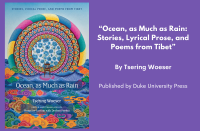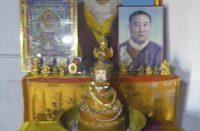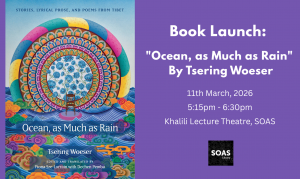
First published by Minotaur Books in November 2012, “Mandarin Gate” is the most recent work of fiction by Eliot Pattison set in Tibet as part of the “Inspector Shan Series”.
From Eliot Pattison’s website:
In an earlier time, Shan Tao Yun was an Inspector stationed in Beijing. But he lost his position, his family and his freedom when he ran afoul of a powerful figure high in the Chinese government. Released unofficially from the work camp to which he’d been sentenced, Shan has been living in remote mountains of Tibet with a group of outlawed Buddhist monks. Without status, official identity, or the freedom to return to his former home in Beijing, Shan has just begun to settle into his menial job as an inspector of irrigation and sewer ditches in a remote Tibetan township when he encounters a wrenching crime scene. Strewn across the grounds of an old Buddhist temple undergoing restoration are the bodies of two unidentified men and a Tibetan nun. Shan quickly realizes that the murders pose a riddle the Chinese police might in fact be trying to cover up. When he discovers that a nearby village has been converted into a new internment camp for Tibetan dissidents arrested in Beijing’s latest pacification campaign, Shan recognizes the dangerous landscape he has entered. To find justice for the victims and to protect an American woman who witnessed the murders, Shan must navigate through the treacherous worlds of the internment camp, the local criminal gang, and the government’s rabid pacification teams, while coping with his growing doubts about his own identity and role in Tibet.
Below is a short review of “Mandarin Gate” written for High Peaks Pure Earth by Jonathan Mirsky. Jonathan Mirsky is a journalist who went to Tibet six times between 1982 and 1988. He is a regular contributor to New York Review of Books.
“Mandarin Gate” By Eliot Pattison
Review by Jonathan Mirsky
Very few novels are set in Tibet so even if the one at hand is a poor one, it deserves mention.
Mr Pattison’s latest novel is one in a series about Shan, a Chinese ex-policeman, now serving as a humble water inspector in Tibet. He speaks Tibetan and is very near to being a devout Buddhist.
The publicist for the book, who has written “Talking Points” to accompany it, observes that what we see here is “the power of fiction over truth.” That is certainly the case in “Mandarin Gate”: we have kindly, devout monks and nuns, grotesque Chinese officials, a murder, a guessing game about who the murderer is, and a bit of male fantasy sex.
To add authenticity, characters toss in bits of Chinese and Tibetan, sometimes wrong, just as the names of the Chinese are written wrongly. The publicity information also asserts that Shan travels to Beijing and the US; he doesn’t.
Finally, the “Talking Points” assert that “Now, … we [ Americans] destroy the vital independent culture of Tibet…We have empowered the Chinese..’ in this. Actually, not… when the forces partially commanded by Deng Xiaoping invaded Tibet in 1950, Washington had not even recognized Peking.
Buy the book on Amazon here: http://amzn.to/1mgDRXd






Mirsky’s review of Mandarin Gate is a headscratcher. I would encourage people to read the many, many additional reviews over at Amazon to get a better–and I will predict more accurate–idea of what to expect in Pattison’s latest. I found this one by Bernstein particularly intriguing: “The best of the Shan series. Interesting expansion of the devastating critique of the Chinese campaign against the Tibetans. The treatment of Chinese intellectuals was also revealing. The mystery was easier to solve, but the character of Meng was particularly complex.” Having gone through this and many other reviews, and as a long time reader of the Inspector Shan series, I am more excited than ever to pick up a copy. I am also planning to spend some time on a real-life mystery: What’s up with Mirsky and Tibet?
Thank you for your comment! Your review of the next in the Inspector Shan series would be welcome here, “The Soul of the Fire”. Or any other Tibet-related title you’d care to review. Email us!
Sounds great, HPPE, and thank you for your hard work on this vital blog!
Mr. Mirsky’s brief review is a little short on literary appreciation of a book of fiction intended for a general audience. If one were to nitpick fiction writing as if they were journalism, we would not be reading many of the greatest books ever written and end up with many empty libraries.
I’ve read three of the books in the series, and as a Tibetan, not only have I found them to be terrifically exciting reading, but also highly insightful. Pattison’s crime novels succeed in capturing the psychological reality of life for Tibetans today inside Tibet better than almost any writing found in the West, and provide a counterpoint to the rare news writing on Tibet which are mainly in the he said she said fence sitting variety which may appear to provide ‘balance’ but little conviction for the truth or clear understanding of what’s happening in Tibet.